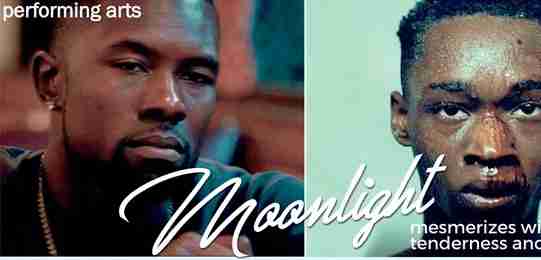By MICHELLE HOLLINGER
MHollinger@Sfltimes.com
The best movies stay with you long after the credits roll. They introduce you to characters who make you forget you’re watching art because their humanity leaps off the screen with a deeply resonating combination of urgency and subtly. Such is the case with Moonlight, an exquisite film that oozes tenderness and authenticity as it presents subject matter ripe for controversial conversation so soulfully it will likely challenge the staunchest homophobes while reaffirming the spiritual notion of oneness.
With the story by Miami’s own, Tarell McCraney, and written and directed with a sure hand by Barry Jenkins, Moonlight is a masterpiece depicting the coming of age journey of Chiron, a young black man struggling with his identity in an environment frequently unwelcoming to homosexuals. While aspects of the movie accurately captured the unwarranted hostility young black gay men often face from their peers; it also captured the unconditional love often instrumental in an “outsider” existing in a safe space while grappling with who they are.
Chiron’s relationship with his drug addicted mother, Paula, played beautifully by Naomie Harris, adds the unpredictable aspect of addiction to his already challenging predicament. His stereotype-bashing encounter with neighborhood drug dealer, Juan (Mahershala Ali) and Juan’s girlfriend, Teresa, (Janelle Monae) give Chiron’s life an unanticipated balance necessary for his evolution.
One of the most tender and unexpected scenes includes Juan (played brilliantly by Ali) teaching Chiron to swim in the ocean, a place that comes to represent freedom for the young man. Monae brings believability to her role as Teresa; believability and genuine compassion.
Ashton Sanders and Trevante Rhodes play Chiron as a teenager and adult, respectively. Both spoke with the South Florida Times during a promotional press junket in Miami Beach.
Sanders said after reading the script, he was hooked. “This is a beautiful read and I want to be a part of this project. This is something special,” he said of his decision to play Chiron during his tormented teenage years. Sanders embodied Chiron, successfully bringing to life the awkwardness and burgeoning inner awareness swirling within the teen, begging for expression.
Moonlight, Rhodes said, “is what cinema is about. This is what filmmaking is, shining a light on demographics and saying ‘yo, you’re not alone. Especially people like Chiron. You go through life tormenting yourself, not loving yourself because you feel that you’re so secluded, you’re so alone, and that’s not the case.,” said the former college football player whose chiseled body and smoldering masculinity provided the perfect external shell for Chiron to hide behind. Rhodes’ has the chops. Dude’s range of sensitivity, vulnerability, masculinity, sadness and loss flowed with the ease expected from a far more seasoned thespian.
He and Sanders agreed that filming the movie on location in Miami’s Liberty Square public housing development also known as “Pork and Beans” was essential to Moonlight’s authenticity.
“The city was a character just as much as Chiron,” Sanders shared, pointing out because of Liberty Square’s high poverty rate, its role in the film helped illustrate a major theme of “finding beauty in pain.”
Each man said the movie’s impact on them extended beyond their roles by imparting crucial life lessons.
“I learned how to love more. I was dealing with a lot of identity issues, with mom being on drugs, too. Learning to forgive, to love and not judge. This film changed my life,” Sanders said.
“I have five percent of Chiron and I got to exhaust 100 percent of that five percent so I got to learn so much about myself in the sense that, you learn to love deeply. You learn the significance of understanding, of acceptance, of forgiveness,” Rhodes explained. “You learn that love really is the only thing that matters.”
Rhodes said he hopes the movie sparks dialogue in the black community regarding the tendency to be contradictory regarding human rights.
“In the black community we fight and we say we want equality, but at the same time, we contradict that because we don’t accept other people either.”
Moonlight opens on Oct. 28.













No Comment